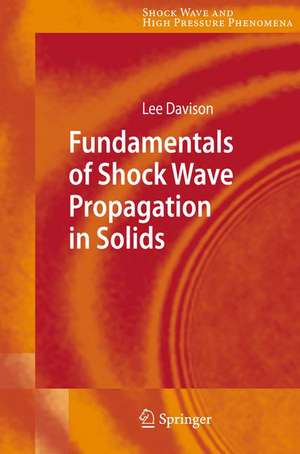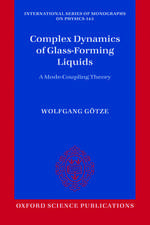Fundamentals of Shock Wave Propagation in Solids: Shock Wave and High Pressure Phenomena
Autor Lee Davisonen Limba Engleză Hardback – 7 mai 2008
My intent in writing this book is to present an introduction to the thermo- chanical theory required to conduct research and pursue applications of shock physics in solid materials. Emphasis is on the range of moderate compression that can be produced by high-velocity impact or detonation of chemical exp- sives and in which elastoplastic responses are observed and simple equations of state are applicable. In the interest of simplicity, the presentation is restricted to plane waves producing uniaxial deformation. Although applications often - volve complex multidimensional deformation fields it is necessary to begin with the simpler case. This is also the most important case because it is the usual setting of experimental research. The presentation is also restricted to theories of material response that are simple enough to permit illustrative problems to be solved with minimal recourse to numerical analysis. The discussions are set in the context of established continuum-mechanical principles. I have endeavored to define the quantities encountered with some care and to provide equations in several convenient forms and in a way that lends itself to easy reference. Thermodynamic analysis plays an important role in continuum mechanics, and I have included a presentation of aspects of this subject that are particularly relevant to shock physics. The notation adopted is that conventional in expositions of modern continuum mechanics, insofar as possible, and variables are explained as they are encountered. Those experienced in shock physics may find some of the notation unconventional.
| Toate formatele și edițiile | Preț | Express |
|---|---|---|
| Paperback (1) | 369.99 lei 3-5 săpt. | +26.34 lei 4-10 zile |
| Springer Berlin, Heidelberg – 21 oct 2010 | 369.99 lei 3-5 săpt. | +26.34 lei 4-10 zile |
| Hardback (1) | 651.67 lei 6-8 săpt. | |
| Springer Berlin, Heidelberg – 7 mai 2008 | 651.67 lei 6-8 săpt. |
Din seria Shock Wave and High Pressure Phenomena
- 24%
 Preț: 804.04 lei
Preț: 804.04 lei - 18%
 Preț: 2099.77 lei
Preț: 2099.77 lei - 18%
 Preț: 1111.97 lei
Preț: 1111.97 lei - 15%
 Preț: 645.28 lei
Preț: 645.28 lei - 18%
 Preț: 948.29 lei
Preț: 948.29 lei - 15%
 Preț: 532.38 lei
Preț: 532.38 lei - 18%
 Preț: 1235.25 lei
Preț: 1235.25 lei - 18%
 Preț: 1132.65 lei
Preț: 1132.65 lei - 18%
 Preț: 1228.96 lei
Preț: 1228.96 lei -
 Preț: 397.01 lei
Preț: 397.01 lei - 18%
 Preț: 949.10 lei
Preț: 949.10 lei - 15%
 Preț: 634.32 lei
Preț: 634.32 lei - 18%
 Preț: 1541.47 lei
Preț: 1541.47 lei - 24%
 Preț: 1040.57 lei
Preț: 1040.57 lei - 15%
 Preț: 642.03 lei
Preț: 642.03 lei - 18%
 Preț: 892.90 lei
Preț: 892.90 lei - 20%
 Preț: 560.55 lei
Preț: 560.55 lei - 18%
 Preț: 1390.73 lei
Preț: 1390.73 lei - 18%
 Preț: 947.50 lei
Preț: 947.50 lei - 18%
 Preț: 957.44 lei
Preț: 957.44 lei - 18%
 Preț: 1126.69 lei
Preț: 1126.69 lei -
 Preț: 384.70 lei
Preț: 384.70 lei - 15%
 Preț: 649.39 lei
Preț: 649.39 lei - 18%
 Preț: 1382.21 lei
Preț: 1382.21 lei -
 Preț: 392.21 lei
Preț: 392.21 lei - 15%
 Preț: 596.36 lei
Preț: 596.36 lei - 18%
 Preț: 1554.72 lei
Preț: 1554.72 lei - 18%
 Preț: 1228.29 lei
Preț: 1228.29 lei - 15%
 Preț: 644.30 lei
Preț: 644.30 lei - 18%
 Preț: 891.80 lei
Preț: 891.80 lei - 18%
 Preț: 951.14 lei
Preț: 951.14 lei - 15%
 Preț: 534.82 lei
Preț: 534.82 lei -
 Preț: 391.79 lei
Preț: 391.79 lei
Preț: 651.67 lei
Preț vechi: 766.67 lei
-15% Nou
124.71€ • 129.72$ • 102.96£
Carte tipărită la comandă
Livrare economică 15-29 aprilie
Specificații
ISBN-10: 3540745688
Pagini: 448
Ilustrații: XII, 433 p.
Dimensiuni: 155 x 235 x 30 mm
Greutate: 0.73 kg
Ediția:2008
Editura: Springer Berlin, Heidelberg
Colecția Springer
Seria Shock Wave and High Pressure Phenomena
Locul publicării:Berlin, Heidelberg, Germany
Public țintă
GraduateCuprins
Mechanical Principles.- Plane Longitudinal Shocks.- Material Response I: Principles.- Material Response II: Inviscid Compressible Fluids.- Material Response III: Elastic Solids.- Material Response IV: Elastic-Plastic and Elastic-Viscoplastic Solids.- Weak Elastic Waves.- Finite-amplitude Elastic Waves.- Elastic-Plastic and Elastic-Viscoplastic Waves.- Porous Solids.- Spall Fracture.- Steady Detonation Waves.
Textul de pe ultima copertă
This book forms an introduction to important aspects of shock-wave propagation in solid materials. Emphasis is on the regime of moderate compression that can be produced by high-velocity impact or detonation of chemical explosives. In this regime relatively simple equations of state are applicable to the description of compression. Solids may also experience inelastic flow, in which elastic-plastic deformation becomes important. The theory provided is that required to conduct research in the field and to pursue its application to ordnance development, Earth and planetary sciences, materials research, and other matters. The book includes a careful account of the kinematical and dynamical equations of the subject along with constitutive equations that describe the distinguishing responses of compressible fluids, elastic solids, and elastic-plastic and elastic-viscoplastic solids. The discussion of wave propagation begins with elementary analyses of important problems of the propagation and interaction of plane longitudinal shocks. This is followed by more refined analyses of problems of plane-wave propagation in the aforementioned materials. Finally, spall fracture, wave propagation in porous solids, and detonation phenomena are discussed. Many illustrative problems can be solved without recourse to extensive numerical analysis. The text includes numerous exercises and detailed solutions to these exercises.
Caracteristici
Provides a reference and tutorial for an interdisciplinary field with applications ranging from astrophysics and geophysics to materials science, aeronautics, and semiconductors
Descriere
My intent in writing this book is to present an introduction to the thermo- chanical theory required to conduct research and pursue applications of shock physics in solid materials. Emphasis is on the range of moderate compression that can be produced by high-velocity impact or detonation of chemical exp- sives and in which elastoplastic responses are observed and simple equations of state are applicable. In the interest of simplicity, the presentation is restricted to plane waves producing uniaxial deformation. Although applications often - volve complex multidimensional deformation fields it is necessary to begin with the simpler case. This is also the most important case because it is the usual setting of experimental research. The presentation is also restricted to theories of material response that are simple enough to permit illustrative problems to be solved with minimal recourse to numerical analysis. The discussions are set in the context of established continuum-mechanical principles. I have endeavored to define the quantities encountered with some care and to provide equations in several convenient forms and in a way that lends itself to easy reference. Thermodynamic analysis plays an important role in continuum mechanics, and I have included a presentation of aspects of this subject that are particularly relevant to shock physics. The notation adopted is that conventional in expositions of modern continuum mechanics, insofar as possible, and variables are explained as they are encountered. Those experienced in shock physics may find some of the notation unconventional.















